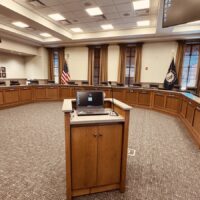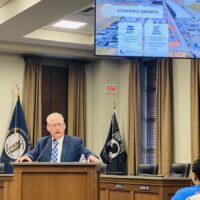Mayor Wendell Lynch’s proposed $38.56 million budget for 2020-21 would cut 4% from all departments and agencies that the city supports, while giving employees a 2.3% cost-of-living-adjustment raise.

The plan adds $1.12 million to the city budget, an increase of almost 3 percent, from this year to next year — but during his budget address Friday morning, Lynch stressed that the 2020-21 budget includes $1.39 million in “new, pass-through contracts” that are funded by other organizations to the city’s benefit.
The difference between that $1.39 million in extra funding and the $1.12 million increase in the budget total means the city will spend $269,847 less in the coming fiscal year than it budgeted in 2019-20.
That means an “apples-to-apples” comparison shows the proposed budget is actually less than the current year’s spending plan, Lynch said during an hourlong address he gave by video from an empty city council chambers Friday morning.
Because of the state’s ban on gatherings that could increase the spread of the novel coronavirus, Lynch delivered the budget proposal in a video live-streamed on Facebook and made available on the city’s website and on City TV. At times, the audio quality was very poor and difficult to understand. However, the presentation included numerous graphics that outlined spending and revenue plans.
The city has “wrung out the excess” in the budget, Lynch said, referring to the $269,847 reduction in spending when taking into account the new, pass-through funding.
In support of the pay raise for employees, Lynch said they did not get an increase in the budget approved last year. The increase will cost $455,047.
The 2020-21 budget uses an estimated $677,000 from reserves, which is also called prior-year revenue, to balance spending, and it proposes to raise one tax — taking the maximum allowed 4% in additional revenue from property taxes. The property tax rate wouldn’t be determined until later in the year when the property valuation administrator’s office releases assessed values on local real estate. At that time, the city council would have the option of setting a rate that generates an additional 4 percent in revenue from property taxes.
Payroll Tax Revenue
The coronavirus’ biggest impact on the city budget will be through the payroll tax, which is the single largest source of income for the city.
“This is unchartered territory,” City Finance Director Robert Martin said in an interview after the mayor’s address.
Kentucky’s stay-at-home orders, plus the closures affecting non-essential businesses such as retail stores, salons, theaters and recreational facilities, have resulted in widespread layoffs and furloughs. Other workers have seen their hours reduced. Since mid-March, approximately 590,000 workers in Kentucky have filed for unemployment benefits.
The mayor’s budget projects that the city’s payroll tax revenue will decline by approximately 7% — from $17.12 million budgeted this year to $15.91 million in the coming year.
Martin said that calculation assumes the following: a 20% decline in July resulting in a $293,000 reduction in revenue; 15% percent ($191,000) in August; 10 percent ($147,000) in September; and 5 percent for the remainder of fiscal year ending June 30, 2021, with the monthly reduction ranging from $65,000 to $80,000. (A 5% decline does not result in the same dollar amount every month because payroll tax revenue historically fluctuates from month to month. A 5% reduction means 5% less when compared to the same month the previous year.)
The monthly projections combine for $1.3 million less in payroll tax revenue in 2020-21.
“I know some businesses will probably never open back up, and some will have fewer employees,” Martin said.
Meanwhile, the city will need to amend the current budget before the end of this fiscal year, June 30, because the coronavirus outbreak has already cut into the city’s payroll tax revenue. Martin said he expects to see a loss of about $1.11 million in the last three months of 2019-20 compared to the same months of the previous year. He estimates the decline will be $320,000 for April, $395,000 for May and $398,000 for June. (Each month represents revenue collected from the tax on the previous month’s payroll.)
For now, city employees have not been affected by the losses occurring in the private sector. Lynch said the city has not implemented any layoffs but he said a hiring freeze is likely.
The city’s reserve fund is approximately $9.4 million, which is enough to balance the shortfalls triggered by the decline in payroll tax revenue — at least as the projections currently stand.
However, no one can say with complete certainty how much the economy will decline.
“It could be much worse,” Lynch said.
The city’s policy is to maintain at least 20 percent of annual operating costs in a reserve fund. Under the proposed budget, that would be 7.6 million.
Pass-Through Contracts
There are three new pass-through contracts in the budget that Lynch highlighted. They are:
- Fort Campbell Intergovernmental Support Agreement (IGSA): $564,352
- School resource officer: $77,610
- Ambulance Board: $748,440
There are two contracts with Fort Campbell. One, for $114,468, is for road salt. The benefit to the city, said Martin, is that Hopkinsville buys more salt to accommodate Fort Campbell’s needs in addition to the city’s and it pays a reduced price for a larger quantity.
The other Fort Campbell contract, for $449,884, is for pavement marking on roads and parking lots. Martin said it covers all of the expense of two new city employees, who do not spend all of their time at Fort Campbell, plus $235,000 for a new stripping truck.
The county school board pays $77,610 for a fourth school resource officer, which covers salary and benefits. Previously, the school board paid for three officers and the city covered the expense of a fourth officer. Now the school board will pay for four, and the city will pay for a fifth resource officer.
The Ambulance Board, which is a separate entity and does not receive any city or county funding, is staffed by Hopkinsville firefighter/paramedics and firefighter/EMTs. The Ambulance Board reimburses the city for those employees, and will be increasing the number from 18 to 30. The $748,440 is the cost for the 12 additional employees.
Other Revenue Sources
In addition to the payroll tax, other major sources of revenue include:
- Business licenses: $1.73 million
- Insurance premium tax: $4.8 million
- Property tax: $5.45 million
Pension Savings
The city will save $550,000 as a result of the state’s decision to freeze for one year the increase local governments were slated to pay to help offset shortfalls in the pension system.
Greenway Bridge
Lynch answered questions about ongoing construction of the Hopkinsville Greenway expansion, including the large pedestrian bridge that will cross Country Club Lane and LaFayette Road.
When completed, the $4.6 million project will add 1.7 miles to the city’s rail-trail, extending it from the Pardue Lane Trailhead to Poston Chapel Road near Eagle Way bypass.
A ground-breaking ceremony for the extension was held Oct. 3.
Construction has been allowed to continue during the coronavirus outbreak, and the city has legal contracts to finish the work, Lynch said.
“This cuts through to the reality of it,” he said. “A contract is a contract.”
City Administrator Troy Body said in an email to Hoptown Chronicle that the city has already spent $1 million on the rail-trail extension, and the pedestrian bridge is being manufactured now for an additional $1 million.
Two state grants, for a combined $1 million, account for part of the funding.
“So, if we stopped the project, the city might save a million in bonded monies but would, essentially, lose nearly $3 million in spent/grant funds with nothing to show for it,” Body said.
Next Steps
Hopkinsville City Council has two Committee of the Whole meetings slated, on May 7 and 14, to discuss the mayor’s budget proposal.
The budget requires two votes to be adopted, which would come during the June council meetings.
If additional time is needed to reach an agreement on the budget, a third Committee of the Whole meeting could be scheduled on May 21.
Jennifer P. Brown is co-founder, publisher and editor of Hoptown Chronicle. You can reach her at editor@hoptownchronicle.org. Brown was a reporter and editor at the Kentucky New Era, where she worked for 30 years. She is a co-chair of the national advisory board to the Institute for Rural Journalism and Community Issues, governing board past president for the Kentucky Historical Society, and co-founder of the Kentucky Open Government Coalition. She serves on the Hopkinsville History Foundation's board.






